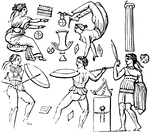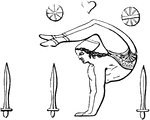Clipart tagged: ‘Salatio’

Salatio
"Dancing. The dancing of the Greeks as well as of the Romans had very little in common with the exercise…

Salatio
"Dancing. The dancing of the Greeks as well as of the Romans had very little in common with the exercise…

Salatio
"Dancing. The dancing of the Greeks as well as of the Romans had very little in common with the exercise…